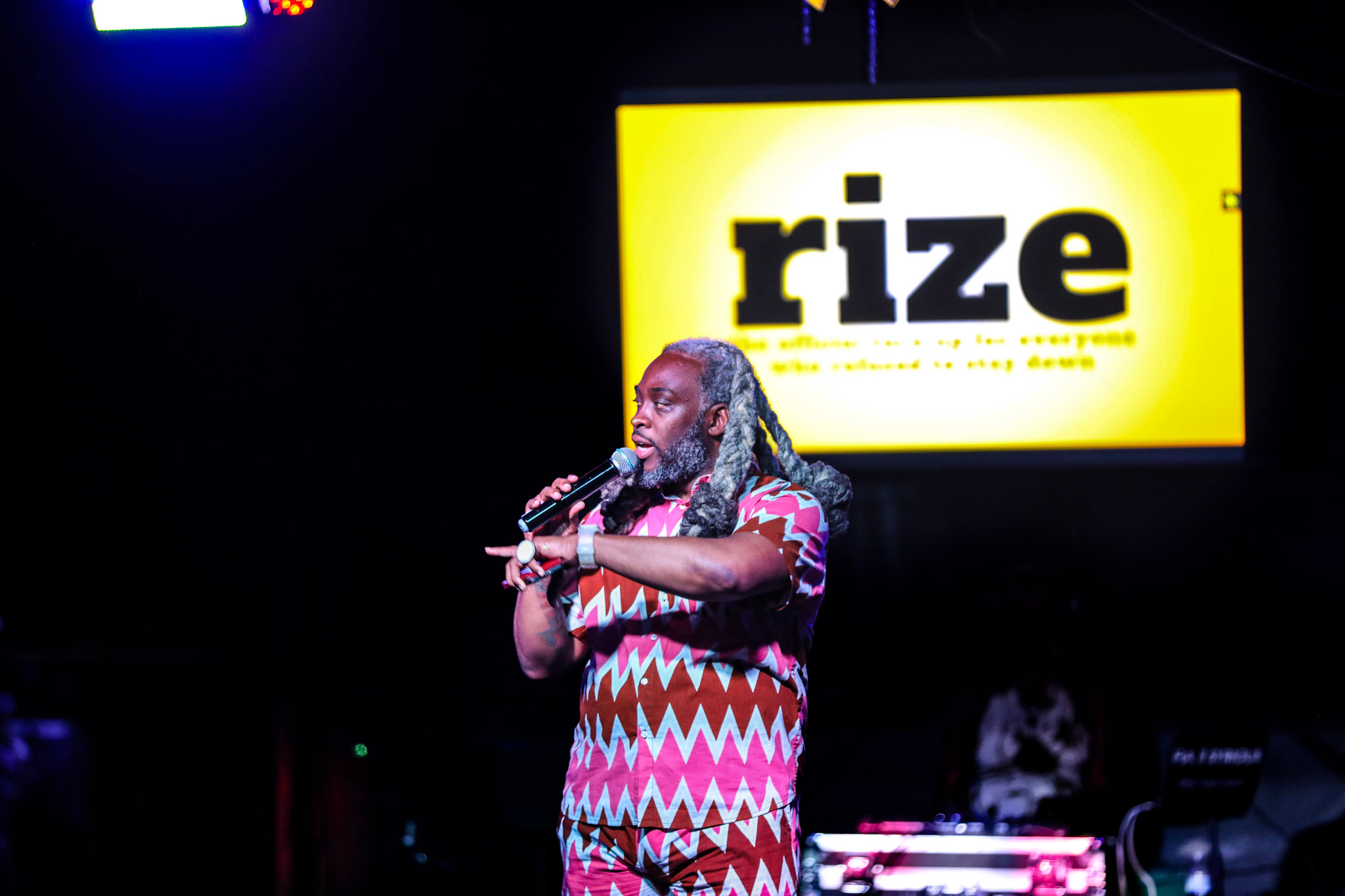
The first time Adán Bean stepped in front of a crowd to perform, he had everything except the one thing that mattered most: confidence in himself.
It was a Friday night party after a high school football game in Massillon, Ohio—a small town so modest it didn't even have a bus system until Adán’s sophomore year. His friends, who had heard him freestyle in private, were hyped to see him perform. They knew he had bars. They believed in his talent before he did.
"I got up there, and I just had my head down," Adán recalls of that pivotal moment at 14. "And then I could slowly start to see them lose confidence, and I remember being like, ‘dang, what happened?’"
What happened was a masterclass in performance that would shape Adán's entire creative journey—one that would eventually see him grace stages from the Kennedy Center to TEDx, earn Emmy nominations, and win the 2017 National Poetry Slam song competition. But in that moment, he learned a fundamental truth: "You can have all the world to offer people, but if you don't look confident selling it, it doesn't matter,” he shares with conviction.
That lesson—learned in the harsh light of teenage embarrassment—would prove prophetic for an artist who has spent his career learning to bet on himself, even when the odds seemed stacked against him. Today, as a renowned spoken word poet, emcee, writer, and creative director who has called Atlanta home for over twenty years, Adán has built a multifaceted career that spans everything from directing documentaries to curating monthly variety shows. He’s built a sustainable, independent career that offers a blueprint for any creative wondering if it's possible to make a living without selling out.
The Origin Story
Adán's mother, an elementary school teacher for 38 years, instilled in him a love of storytelling and reading that would become the foundation of his artistic expression. "I was the annoying kid who couldn't read but wanted to read everything," he shares. "So I would always be asking, ‘What does this say? What does this say? What does this say?’"
That insatiable curiosity extended to hip-hop culture, where Adán found his voice through the work of conscious rappers like Nas, Jay-Z, and Common. He absorbed the storytelling traditions of East Coast and Midwest emcees who painted vivid pictures of their communities. This foundation would later inform his evolution into script-writing for his high school Black History Month plays and eventually, spoken word poetry, too.

The Education: Learning The Business Behind the Art
At Morehouse College, where Adán studied English, his world expanded exponentially. He formed a rap group and discovered that creativity could be more than a hobby. It was an internship with the National Black Arts Festival in Atlanta that became his MBA in creative entrepreneurship. "That was my first time looking through contracts, sending them out, looking at who's getting paid what, how they're negotiating, and talking to agents," he recalls.
Then, a visit to visual artist Radcliffe Bailey's studio in Cascade became a revelation. "He lived around Black people. He was world-renowned, and he was making his art and making a living,” he reflects. “I had no idea that was a possibility."
Why Bad Deals Make Good Teachers
After graduation, Adán and his group signed what seemed like the dream—a record deal, but the reality was far more sobering. "It was not a great deal, but we didn't know that at the time. We were just happy to sign a deal."
The contract locked them in for nearly a decade, a period that could have broken many artists' spirits. Instead, Adán treated it as graduate school in the music business, touring the country and learning the ins and outs of the industry while working a day job in search engine marketing that provided stability without consuming his creative energy.
"I wanted something stable, but not overwhelming," he explains. "So I ended up applying for a temp job that became a thing that I could go to from nine to five and then leave it there and do whatever I needed to do outside of that."
The Leap: From Employee to Independent Creative
In 2017, faced with a corporate relocation he didn't want, Adán made a decision that would define the next chapter of his life. He took the severance package and gave himself six months to see what he could build with his decade of connections and experience. "I just said I would give it a shot. I would see what I could pull off with that six-month runway,” he recounts. “It's 2025, and I'm still doing it."
Today, Adán has crafted a sustainable model that balances creative freedom with financial stability. Working as a freelance associate creative director for agencies—with clients ranging from AT&T and Delta Airlines to Coca-Cola and Def Jam—he signs three-to-six-month contracts that provide predictable income while leaving room for passion projects like his documentary "Curb Appeal," which tackles housing insecurity, or his monthly variety show Good*Night at Buteco in Grant Park.
"Creativity and art aren't above falling to the same toxic romanticism that entrepreneurship gets labeled with,” he says, quick to dispel romantic notions about creative independence. "What's been helpful for me is working in this space where I have a baseline of finances that I can account for monthly," he explains. The model isn't without challenges—no health benefits from the agency, seasonal fluctuations in work, the constant hustle to patch together enough projects—but it gives him something many traditional employees lack: control over his time and creative output.

The Mindset: Why Fear Is the Enemy of Success
Maybe the most powerful insight from Adán's journey comes from his reflection on what he'd tell his younger self. After decades of building a sustainable creative career, his advice cuts straight to what holds most creatives back: "I wish I was not afraid earlier in life. I honestly just wish I failed more profoundly."
This isn't recklessness he's advocating for, but rather a recognition that the fear of failure—better yet, lack of control—often prevents creatives from pursuing the opportunities that could transform their careers. "I guarantee you there's things that rock bottom can teach you that nothing else will be able to communicate to you,” he says wisely.
Taking the Shot
Adán Bean’s story isn't one of overnight success or lucky breaks. It's a practical model for any creative who's tired of choosing between freedom and stability. From that first nervous performance at a high school party to representing Atlanta on multiple National Poetry Slam teams, from signing a bad record deal to earning fellowships from Emory University and the Serenbe Frances Focus Fellowship, Adán’s journey show us that the act of trying teaches you things that sitting on the sidelines never can.
Lessons like how…
- Structure can enhance creativity rather than limiting it because having reliable income streams frees you to take artistic risks.
- Bad deals can become good education if you treat them as learning opportunities rather than career disasters.
- Fear is expensive—the opportunities you don't pursue because of fear cost more than the ones that don't work out.
In a world that often doesn’t understand independent creative careers, Adán has built a life where creativity and stability can coexist, where the practical and the passion inform each other, and where the willingness to bet on yourself—repeatedly, imperfectly, but persistently—becomes the foundation for a career that moves both your soul and your soles. Whether he's working on his sophomore EP, compiling his first collection of poems and essays, or performing a Tiny Desk concert, Adán lives out the truth that creative fulfillment and financial sustainability aren't mutually exclusive.
And he leaves both you and his younger self with this nudge: "Just do it. Just go after that sh*t."
-
While others stay stuck in jobs that drain them, join 1000+ professionals finding purpose and building the courage to bet on themselves. Get weekly content, real life stories, and the permission you've been waiting for—delivered straight to your inbox. Your future self will thank you.



